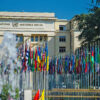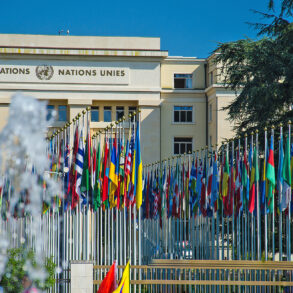Abortion is not only one of the most controversial issues in the USA. In European countries, too, it is currently the subject of dispute between camps. While Christian conservative groups, who often call themselves “pro-lifers”, reject a “right to abortion,” progressives in the West defend it.
On 24 June 2022, this contentious issue took on a new dynamic. The US Supreme Court, stacked with conservative justices by Donald Trump, overturned the Roe v. Wade ruling that had been in place since 22 January 1973. The precedent at the time established a woman’s autonomy to decide whether to maintain or terminate a pregnancy. As a result, US states can now ban abortion as they see fit, which some Republican-ruled ones have already done.
The Muslim community in the USA, like the American society as a whole, has reacted to the landmark ruling of the highest court in part in a polarised manner. Muslims close to the Democrats or belonging to a “woke” activist camp joined in the fierce criticism of the decision. They fear that the anti-Muslim Christian right has emerged stronger. Political conservatives welcomed the repeal. A significant component of US Muslims falls somewhere in between.
On 30 June, the Council on American-Islamic Relations (CAIR) released a survey of attitudes among US Muslims on the upcoming midterm congressional elections in November 2022, including opinions on abortion and Roe v. Wade. It is clear that there is no uniformity of opinion among communities and their members. However, the surveys revealed that black Muslims, on average, vote for stricter regulation of abortion than all other ethnic origin groups.
13.7 per cent of respondents said they would support laws allowing abortion at any stage of pregnancy up to birth without restrictions. 14.9 supported laws allowing abortions up to the 20th week of pregnancy, provided there is an exception for medical emergencies. 12.8 favoured laws allowing abortions up to the 15th week of pregnancy, provided there are exceptions for medical emergencies. 13.1 support laws allowing abortions up to the sixth week of pregnancy, provided there is a medical emergency. 7.2 of respondents said they would support laws banning abortions at any stage of pregnancy with no exceptions.
Dr Yasir Qadhi, a well-known orator and preacher, warned Muslims in his country against being taken in by the two divided political camps. Islamic law is neither “Republican” nor “Democratic.” It is understandable if Muslims are carried away by current debates. However, the religion of Islam demands “a higher degree of academic integrity.” Public voices should first familiarise themselves with the legal position on the abortion dispute before “speaking out in the name of faith on such a sensitive issue.”
Musa Furber, a US scholar and expert on Islamic law, also spoke out against politicisation. Not a single school – regardless of its specific stance – would have “socio-political identity politics” or “culture war” as the basis of its legal sources. Neither would they refer to the US Constitution and the Supreme Court. There would be no need for Muslims to adopt the views of the political camps in the US as their own, nor to reduce their differentiated views to “one” that corresponded to the societal opinion of the US party.
Furber pointed out that the positions of Islamic legal scholars cannot be reduced to the dialectic of Christian conservatives and liberals in the US. For example, many would have declared abortion permissible up to the time of the imbibement of the soul (40 to 120 days after conception, depending on the view). In cases of pregnancy as a result of rape, some assumed that abortion was possible afterwards.
A look at the different positions of the scholars and their schools does not show a uniform opinion. While the majority of fuqaha following Imam Malik are of the opinion that the breathing in of the soul begins with the act of procreation, others assume a point in time between 40 and 120 days. Maliki and Hanbali ‘Ulama see divine intervention at work at every stage of the foetus’ development. Many others, especially from the Hanafi school, see within the period until the soul is breathed in (max. 120 days) a permission of abortion.
The US scholar and author Dr. Abdullah bin Hamid Ali summarised the different positions of Muslim schools and jurists on abortion as follows: unlawful at all stages of pregnancy; permitted during the first 40 days, but haram thereafter; disliked (makruh) during the first 40 days, but haram thereafter; permitted if pregnancy is the result of unlawful sexual intercourse; unconditionally permitted before the 120th day; and permitted only with a legitimate reason. Moreover, Bin Hamid Ali believes that Muslims should not only observe what jurists say about it. They should additionally consider the relevant theology and ethics.
In a relevant and concise article for the German online magazine IslamiQ, Abdurrahman Reidegeld, a scholar and translator who teaches in Austria, introduced important concepts and positions around pregnancy, the beginning of life and abortion on 23 July. He makes it clear that (unlike evangelicals in the USA) one can only speak of a “complete human being” when the soul has been breathed into the developing body. Depending on the interpretation of existing prophetic statements, this begins at the earliest with the 40th day of pregnancy and ends at the maximum with the 120th day of pregnancy.
According to Reidegeld, the difference between an inanimate embryo and an animate foetus is decisive. Regardless of the respective time limit, there are only two “ethically unobjectionable” reasons for an abortion after its expiry: if the life of the expectant mother is threatened or if there are ethical arguments such as rape or incest. An actual or feared disability of the unborn child was not affected.
He made it clear that on the issue of abortion (like divorce) there was a difference between a negative attitude on the part of the doctrine and a “morally reprehensible” character. “There is no maximum position here, but a multi-layered weighing, which is also expressed quite differently in the different schools of law.”











